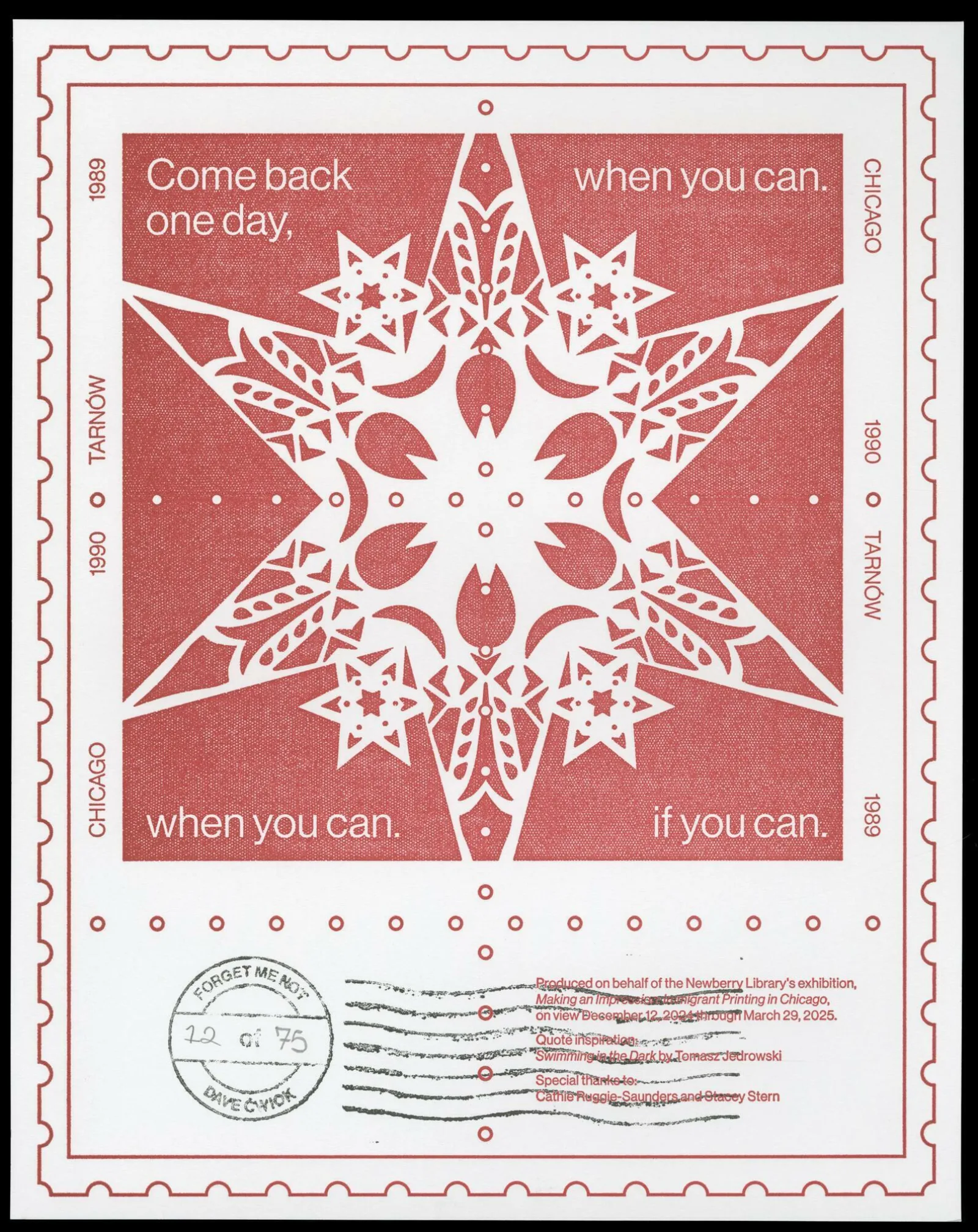In September of 2024, eight current and former students at the School of the Art Institute of Chicago (SAIC) visited the Newberry to see and learn about the items on display in Making an Impression: Immigrant Printing in Chicago. In response, each student created their own broadside designs to share with exhibition visitors. The artist's statement below accompanies their finished broadside and explains the artist's style, approach, and intentions.
“When do you plan on visiting? Are you going for Christmas? Maybe for the summer? When was the last time you went? Who is in Poland right now?” are the questions that pop up in many of my family conversations. The majority of my family has been here in the United States my entire life, but the root of my family tree has stayed in Poland. My grandmother patiently sits and waits in our hometown of Tarnów. She waits for the pitter patter of family to fill her home for a few weeks ever since all her children immigrated. As a first-generation American, “home” is split in two. I will never feel settled in choosing between Chicago or Poland.
For me, immigrant printing is writing letters to loved ones in the hopes of staying connected as best as they can. In this project, I reinterpret immigrant printing in the physicality of mail, at the heart of which lies communication. In my research process, I connected historical events to the personal experiences my family has lived through, specifically when Poland was under Communist rule. I was particularly struck by the realities of censored and surveilled communication. Envelopes would come to your doorstep haphazardly taped together after a government worker had torn it open to black out anything deemed inappropriate. Phone calls were tapped, audios were cut, and families were forced to hold back information from their conversations. Though Poland is no longer under Communist rule, I feel the echoes of these communication limitations, in the act of Google translating letters to my grandparents, hoping they might understand the love I was sending from Chicago.
Forget Me Not takes the form of a block of stamps. I began collecting stamps during my first visit to Poland as a first grader. Through stamps, one can learn many points of history about a country. I took inspiration from the stamps that were printed in honor of Solidarność, Solidarity, a trade union that formed in September 1980 as an uprising against the Communist Soviets in Poland. These stamps have heavy usage of red, white, and black. They also used sans serif typefaces in contrast to the graffiti-based logo of Solidarność.
In this broadside, I combine historical forms, taking inspiration from a variety of sources in my Polish heritage. The textured background of Forget Me Not comes from a stamp I scanned from my own collection. The imagery seen in the center of the stamp block was inspired by the traditional form of paper cut out folk art in Poland called wycinanki, meaning cutouts. I used this form of art to highlight the connections between my identity as a Chicagoan and a Polish-American. The coat of arms for my family’s hometown uses the same star that appears four times within the Chicago flag. In Forget Me Not, the various shapes cut out from within the stars are references to locations within Tarnów, Chicago, and the Forget Me Not flower.
Forget Me Not is about the hope and fatigue of trying to stay connected. This broadside display the act of trying to remain connected to a group identity while concurrently maintaining a sense of self. There is discovery and pride in being Polish American. Simultaneously there is exhaustion from being tied to two distant places. This feeling is reminiscent of a flower, with its all petals picked off in the hopes of landing on one of two answers to a question. Picking apart a flower is how I tried to understand the decision behind leaving Poland for the United States in the 1980s. This gesture is also remarkably similar to the act of tearing a stamp from a sheet to mail a letter to a loved one. In this case, the question being asked as one picks off each petal is: what is the difference between “Come back one day if you can” and “Come back one day when you can”?
